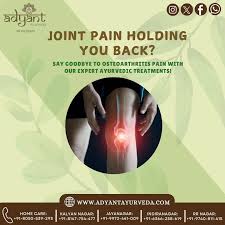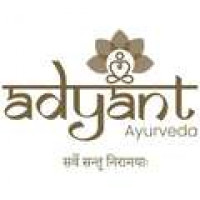Ayurvedic Treatment for Joint Pain: Discover Natural Healing at Adyant Ayurveda

Strong 8k brings an ultra-HD IPTV experience to your living room and your pocket.
Joint pain can affect anyone—young or old—disrupting daily life and diminishing the joy of movement. If you’ve been struggling with stiff knees, aching shoulders, or persistent back discomfort, it’s time to consider a holistic and root-cause approach. Ayurvedic treatment for joint pain offers time-tested, natural remedies that not only relieve symptoms but restore overall health. At Adyant Ayurveda, Bangalore’s trusted Ayurvedic clinic, we specialize in customized healing protocols that rejuvenate your joints, body, and mind.
Introduction to Joint Pain
Joint pain refers to discomfort, aches, or inflammation in any of the joints—knees, hips, shoulders, elbows, or spine. It may be mild or severely debilitating, often linked to conditions like arthritis, osteoarthritis, rheumatoid arthritis, gout, or injury.
Unlike conventional medicine that often focuses on symptom suppression, Ayurveda seeks to identify and eliminate the root cause of joint pain, offering sustainable healing without side effects.
Causes and Symptoms: A Modern and Ayurvedic Perspective
🔬 Modern Causes of Joint Pain:
Osteoarthritis – Cartilage wear and tear due to aging
Rheumatoid Arthiritis– Autoimmune inflammation of joints
Gout – Uric acid crystal buildup
Injury or overuse – Sports, work, or posture-related
Vitamin D or calcium deficiency
🌿 Ayurvedic View:
According to Ayurveda, joint pain is primarily due to Vata Dosha aggravation. When Vata (air and ether) becomes imbalanced, it dries out the synovial fluid (joint lubrication), leading to stiffness, cracking, and pain. Accumulation of Ama (toxins) further blocks channels (Srotas), aggravating inflammation.
Common Symptoms:
Symptom Modern View Ayurvedic View
Joint stiffness Cartilage degeneration Vata imbalance and Ama accumulation
Swelling and redness Inflammation Pitta vitiation with Rakta involvement
Warmth around joints Autoimmune or infection Pitta-related Ama
Cracking sounds Cartilage wear or air bubbles Vata blocking Srotas
Ayurvedic Diagnosis and Dosha Involvement
At Adyant Ayurveda, we begin with a detailed consultation and pulse diagnosis to assess the dominant doshas involved and identify Ama presence, Dhatu depletion, or Srotas blockage.
Dosha-Based Joint Pain Classifications:
Dosha Involved Characteristics Common Conditions
Vata Dryness, cracking, stiffness Osteoarthritis, age-related pain
Pitta Burning sensation, redness, swelling Inflammatory arthritis, gout
Kapha Heaviness, dull pain, cold stiffness Rheumatoid arthritis, water retention
Personalized Ayurvedic Treatment Protocols at Adyant Ayurveda
Every treatment plan is personalized based on your dosha, age, pain severity, digestion, and immune status. Here's how we approach healing:
1. Panchakarma Detox
A foundational step in Ayurvedic joint pain treatment. It includes:
Virechana – Detoxes liver and Pitta toxins
Basti (medicated enema) – Balances Vata, clears toxins from colon
Abhyanga (oil massage) – Nourishes joints, reduces stiffness
Swedana (herbal steam) – Relieves pain and opens blocked channels
2. Herbal Remedies
Adyant’s expert doctors prescribe potent, classical Ayurvedic formulations such as:
Yogaraja Guggulu
Mahayograj Guggulu
Rasnasaptakam Kashayam
Ashwagandha, Shallaki, and Nirgundi
These herbs reduce inflammation, lubricate joints, and strengthen bones.
3. Local Therapies
Janu Basti (knee oil pooling)
Kati Basti (lower back)
Lepa (herbal paste application)
Pizhichil (oil bath therapy)
Each therapy is chosen based on your dosha and joint condition.
Food Guidelines and Lifestyle Recommendations
Diet and lifestyle play a vital role in joint health. An anti-inflammatory, dosha-balancing diet supports faster recovery.
Joint Pain Diet Chart (Based on Dosha):
Food Type Vata Pain Pitta Pain Kapha Pain
Oils Ghee, sesame oil Coconut oil, olive oil Mustard oil, less oily
Grains Rice, oats Barley, quinoa Millet, buckwheat
Vegetables Cooked carrots, beets Bitter gourd, cucumber Leafy greens, garlic
Avoid Dry, fried foods Spicy, sour foods Dairy, cold foods
Spices Ginger, turmeric Coriander, fennel Black pepper, clove
Lifestyle Tips:
Practice gentle yoga (Vrikshasana, Tadasana)
Avoid excessive walking or strain
Use warm compresses
Maintain regular sleep routine
Drink warm water with turmeric daily
Real-Life Healing Stories from Adyant Ayurveda
Mr. Ravi, 52, from Bangalore had chronic osteoarthritis in both knees and was advised surgery. After 3 months of Panchakarma, herbal treatment, and diet correction at Adyant Ayurveda, his pain reduced by 80%, and he resumed daily walking.
Mrs. Lakshmi, 47, struggled with rheumatoid arthritis. Through individualized Basti therapy and internal medications, her inflammation reduced significantly, and her energy levels improved.
These stories reflect the power of Ayurvedic healing when done right.
Expert Insights from Dr. Shree Lakshmi, Medical Director – Adyant Ayurveda
"Joint pain is not just a local issue—it reflects deeper imbalances in the body. At Adyant Ayurveda, we emphasize diagnosing the root cause, whether it's aggravated Vata, Ama toxicity, or Dhatu depletion. Our protocols are not generic; they are designed after detailed Prakriti analysis, lifestyle evaluation, and dosha assessment. With proper Panchakarma, diet, and herbal support, most joint conditions can be reversed or significantly improved."
Dr. Shree Lakshmi’s expertise ensures that each patient receives a science-backed, personalized path to recovery.
Frequently Asked Questions (FAQs)
Q1: How long does it take to heal joint pain with Ayurveda?
A: Depending on the severity, age, and constitution, results may be visible in 3–6 weeks. Chronic cases may need 2–3 months of consistent therapy.
Q2: Is Panchakarma painful?
A: No. Panchakarma is gentle and therapeutic. At Adyant, therapies are supervised to ensure comfort and safety.
Q3: Can Ayurveda treat arthritis permanently?
A: Ayurveda can significantly reduce or eliminate symptoms by correcting the root cause. Lifestyle changes and regular follow-ups are essential for sustained relief.
Q4: Is Ayurvedic treatment safe alongside allopathy?
A: Yes, Ayurvedic treatments can complement allopathy. Our doctors assess current medications before starting therapy.
Ready to Walk Pain-Free Again?
Your joints deserve care beyond temporary painkillers. Choose the holistic path to healing with Ayurvedic treatment for joint pain at Adyant Ayurveda. Our team is here to guide you at every step with compassion, expertise, and authentic Ayurveda.
Book a free consultation with Adyant Ayurveda – https://adyantayurveda.com/book-appointment/
Contact Adyant Ayurveda
📞 +91 99725 41009
Adyant Ayurveda Branches in Bangalore:
Jayanagar | Indiranagar | RR Nagar | Kalyan Nagar
Note: IndiBlogHub features both user-submitted and editorial content. We do not verify third-party contributions. Read our Disclaimer and Privacy Policyfor details.


